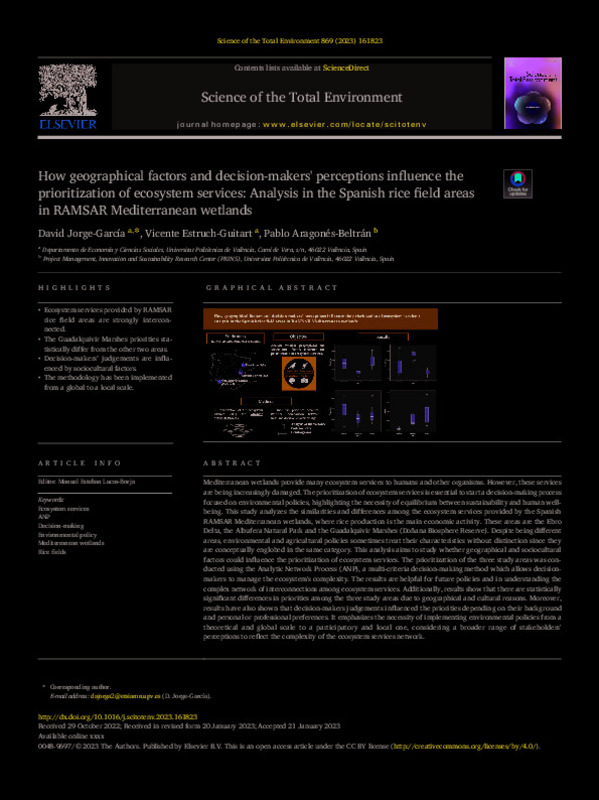JavaScript is disabled for your browser. Some features of this site may not work without it.
Buscar en RiuNet
Listar
Mi cuenta
Estadísticas
Ayuda RiuNet
Admin. UPV
How geographical factors and decision-makers' perceptions influence the prioritization of ecosystem services: Analysis in the Spanish rice field areas in RAMSAR Mediterranean wetlands
Mostrar el registro sencillo del ítem
Ficheros en el ítem
| dc.contributor.author | Jorge-García, David
|
es_ES |
| dc.contributor.author | Estruch-Guitart, Vicente
|
es_ES |
| dc.contributor.author | Aragonés-Beltrán, Pablo
|
es_ES |
| dc.date.accessioned | 2024-02-09T09:39:56Z | |
| dc.date.available | 2024-02-09T09:39:56Z | |
| dc.date.issued | 2023-04-15 | es_ES |
| dc.identifier.issn | 0048-9697 | es_ES |
| dc.identifier.uri | http://hdl.handle.net/10251/202490 | |
| dc.description.abstract | [EN] Mediterranean wetlands provide many ecosystem services to humans and other organisms. However, these services are being increasingly damaged. The prioritization of ecosystemservices is essential to start a decision-making process focused on environmental policies, highlighting the necessity of equilibrium between sustainability and human wellbeing. This study analyzes the similarities and differences among the ecosystem services provided by the Spanish RAMSAR Mediterranean wetlands, where rice production is the main economic activity. These areas are the Ebro Delta, the Albufera Natural Park and the Guadalquivir Marshes (Doñana Biosphere Reserve). Despite being different areas, environmental and agricultural policies sometimes treat their characteristics without distinction since they are conceptually englobed in the same category. This analysis aims to study whether geographical and sociocultural factors could influence the prioritization of ecosystem services. The prioritization of the three study areas was conducted using the Analytic Network Process (ANP), a multi-criteria decision-making method which allows decision-makers to manage the ecosystem's complexity. The results are helpful for future policies and in understanding the complex network of interconnections among ecosystem services. Additionally, results show that there are statistically significant differences in priorities among the three study areas due to geographical and cultural reasons. Moreover, results have also shown that decision-makers judgements influenced the priorities depending on their background and personal or professional preferences. It emphasizes the necessity of implementing environmental policies from a theoretical and global scale to a participatory and local one, considering a broader range of stakeholders' perceptions to reflect the complexity of the ecosystem services network. | es_ES |
| dc.description.sponsorship | Funding for open access charge: CRUE-Universitat Politècnica de València. We would like to thank all the farmers, technicians and organizations that have participated as experts in this study. | es_ES |
| dc.language | Inglés | es_ES |
| dc.publisher | Elsevier | es_ES |
| dc.relation.ispartof | Science of The Total Environment | es_ES |
| dc.rights | Reconocimiento (by) | es_ES |
| dc.subject | Ecosystem services | es_ES |
| dc.subject | ANP | es_ES |
| dc.subject | Decision-making | es_ES |
| dc.subject | Environmental policy | es_ES |
| dc.subject | Mediterranean wetlands | es_ES |
| dc.subject | Rice fields | es_ES |
| dc.subject.classification | ECONOMIA, SOCIOLOGIA Y POLITICA AGRARIA | es_ES |
| dc.subject.classification | PROYECTOS DE INGENIERIA | es_ES |
| dc.title | How geographical factors and decision-makers' perceptions influence the prioritization of ecosystem services: Analysis in the Spanish rice field areas in RAMSAR Mediterranean wetlands | es_ES |
| dc.type | Artículo | es_ES |
| dc.identifier.doi | 10.1016/j.scitotenv.2023.161823 | es_ES |
| dc.rights.accessRights | Abierto | es_ES |
| dc.contributor.affiliation | Universitat Politècnica de València. Escuela Técnica Superior de Ingenieros Industriales - Escola Tècnica Superior d'Enginyers Industrials | es_ES |
| dc.contributor.affiliation | Universitat Politècnica de València. Escuela Técnica Superior de Ingeniería Agronómica y del Medio Natural - Escola Tècnica Superior d'Enginyeria Agronòmica i del Medi Natural | es_ES |
| dc.description.bibliographicCitation | Jorge-García, D.; Estruch-Guitart, V.; Aragonés-Beltrán, P. (2023). How geographical factors and decision-makers' perceptions influence the prioritization of ecosystem services: Analysis in the Spanish rice field areas in RAMSAR Mediterranean wetlands. Science of The Total Environment. 869. https://doi.org/10.1016/j.scitotenv.2023.161823 | es_ES |
| dc.description.accrualMethod | S | es_ES |
| dc.relation.publisherversion | https://doi.org/10.1016/j.scitotenv.2023.161823 | es_ES |
| dc.type.version | info:eu-repo/semantics/publishedVersion | es_ES |
| dc.description.volume | 869 | es_ES |
| dc.identifier.pmid | 36708824 | es_ES |
| dc.relation.pasarela | S\481760 | es_ES |
| dc.contributor.funder | Universitat Politècnica de València | es_ES |
| dc.subject.ods | 02.- Poner fin al hambre, conseguir la seguridad alimentaria y una mejor nutrición, y promover la agricultura sostenible | es_ES |
| dc.subject.ods | 03.- Garantizar una vida saludable y promover el bienestar para todos y todas en todas las edades | es_ES |
| dc.subject.ods | 06.- Garantizar la disponibilidad y la gestión sostenible del agua y el saneamiento para todos | es_ES |
| dc.subject.ods | 08.- Fomentar el crecimiento económico sostenido, inclusivo y sostenible, el empleo pleno y productivo, y el trabajo decente para todos | es_ES |
| dc.subject.ods | 11.- Conseguir que las ciudades y los asentamientos humanos sean inclusivos, seguros, resilientes y sostenibles | es_ES |
| dc.subject.ods | 13.- Tomar medidas urgentes para combatir el cambio climático y sus efectos | es_ES |
| dc.subject.ods | 15.- Proteger, restaurar y promover la utilización sostenible de los ecosistemas terrestres, gestionar de manera sostenible los bosques, combatir la desertificación y detener y revertir la degradación de la tierra, y frenar la pérdida de diversidad biológica | es_ES |
| dc.subject.ods | 17.- Fortalecer los medios de ejecución y reavivar la alianza mundial para el desarrollo sostenible | es_ES |








